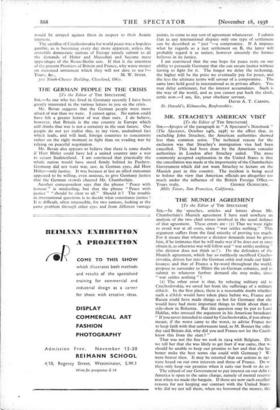THE GERMAN PEOPLE IN THE CRISIS
[To the Editor of THE SPECTATOR] SIR,—As one who has lived in Germany recently I have been greatly interested in the various letters to you on the crisis.
Mr. Bevan suggests that the German people were more afraid of war than we were. I cannot agree. No nation could have felt a greater horror of war than ours. I do believe, however, that Britain is the one country in Europe which still thinks that war is not a certainty in the near future. Our people do not yet realise this, in my view, undoubted fact which leads, and will lead, foreign countries to concentrate rather on the right moment to fight than on evading war by relying on peaceful negotiation.
Mr. Bevan also, appears to believe that there is some doubt if Herr Hitler could have led a united country- into a war to secure Sudetenland. I am convinced that practically the whole nation would have stood firmly behind its Fuehrer. Germany did not want war, nor, in German eyes, did Herr Hitler—only justice. It was because at last an allied statesman appeared to be willing, even anxious, to give Germany justice that the German crowds cheered Mr. Chamberlain.
Another correspondent says that the phrase " Peace with honour " is misleading, but that the phrase " Peace with justice " " should be clear to all." Should it ? The trouble in international questions is to decide what constitutes justice It is difficult, often impossible, for two nations, looking at the same problem through other eyes and from different vantage points, to come to any sort of agreement whatsoever. I submit that in any international dispute only one type of settlement Can be described as " just "—a compromise. If A imposes what he regards as a just settlement on B, the latter will probably regard it as unjust, however sincerely the former believes in its justice.
I am convinced that the one hope for peace rests on our ability to persuade Germany that she can secure justice without having to fight for it. The longer we delay the reckoning, the higher will be the price we eventually pay for peace, and the less the ultimate terms will savour of a compromise. The same laws hold good in international as in private affairs. You may delay settlement, but the interest accumulates. Such is the way of the world, and as you cannot put back the clock, settle now.—I am, Sir, your obedient servant,
























































 Previous page
Previous page